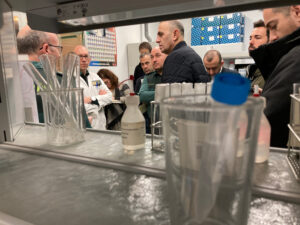
08/03/2024
The Minister for Ecological Transition and the Demographic Challenge, Teresa Ribera Rodríguez, receives the Lebanese delegation

From left to right: Director of the Lebanese Security Forces School, Minister for Ecological Transition and Demographic Challenge, Lebanese Minister of the Environment, Lebanese Ambassador to Spain, Director of the FIIAPP, Director of the Security, Peace and Development Area of the FIIAPP.
A Lebanese delegation led by the Lebanese Minister of Environment and the director of the school of the Internal Security Forces (FSI) has visited this week different Spanish institutions involved in the prevention of environmental crimes.
For four days, Lebanese agents of the Internal Security Forces (FSI) specialised in crimes have visited the facilities of SEPRONA of the Guardia Civil, where they were able to see the crime laboratory for crimes against the environment, the National Museum of Natural Sciences, and the Environmental Prosecutor’s Office. They also visited the Iberian Birds of Prey Recovery Centre (CERI) in Toledo and did not leave Madrid without visiting the Ministry of Ecological Transition and the Demographic Challenge and being received by the Minister, Teresa Ribera Rodríguez. 
“From the Guardia Civil we are delighted to be able to share our experience in environmental protection with other countries. Working hand in hand with our counterparts also allows us to be more operational when dealing with this type of crime when it transcends borders,” said Lieutenant Colonel Luis Alberto Madero, head of strategy and international cooperation at SEPRONA headquarters.
The aim of this visit, which is part of the European project Promoting Community Policing in Lebanon, implemented by the FIIAPP with CIVIPOL (France), was the direct exchange of experiences between the Spanish and Lebanese specialists in order to strengthen the protection and the proper functioning of the fight against environmental crimes of the Lebanese Security Forces.
The Lebanese minister declared that “the way in which different parts of different institutions collaborate with each other has been very interesting and we are going to take some of their best practices and some of the lessons we have learned in Spain to our country”.
Lebanon, in the midst of a major economic and security crisis, also faces significant environmental challenges such as pollution from hazardous chemicals, overflowing landfills, waste management and water pollution, among others. Despite existing environmental protection legislation and regulations and the creation of a specific ministry for the environment, the problem lies in the implementation of these legal texts. The penalties provided for by environmental legislation are not dissuasive, despite the fact that every environmental offence is classified as an infraction. No environmental damage is classified as an offence. The lack of enforcement, lack of investigation – with the consequent closure of cases – and the absence of a national complaints centre specialised in environmental crimes are major challenges.
The project is cooperating closely with environmental associations, and in particular with Terre Liban, a civil society organisation that has launched – in partnership with the project – a mobile application under development to receive, monitor and follow up environmental crimes, which can be reported by any citizen to the police (FSI).
This visit will allow Lebanese specialists to familiarise themselves with European best practices in environmental protection, exchange views on the adjustments needed in the FSI to combat environmental crimes, assess the skills, knowledge and capacities of FSI officers in regional and local stations (mainly those close to forests, reserves and rivers) and draft a concrete proposal for the creation of a specialised unit for environmental crimes.


